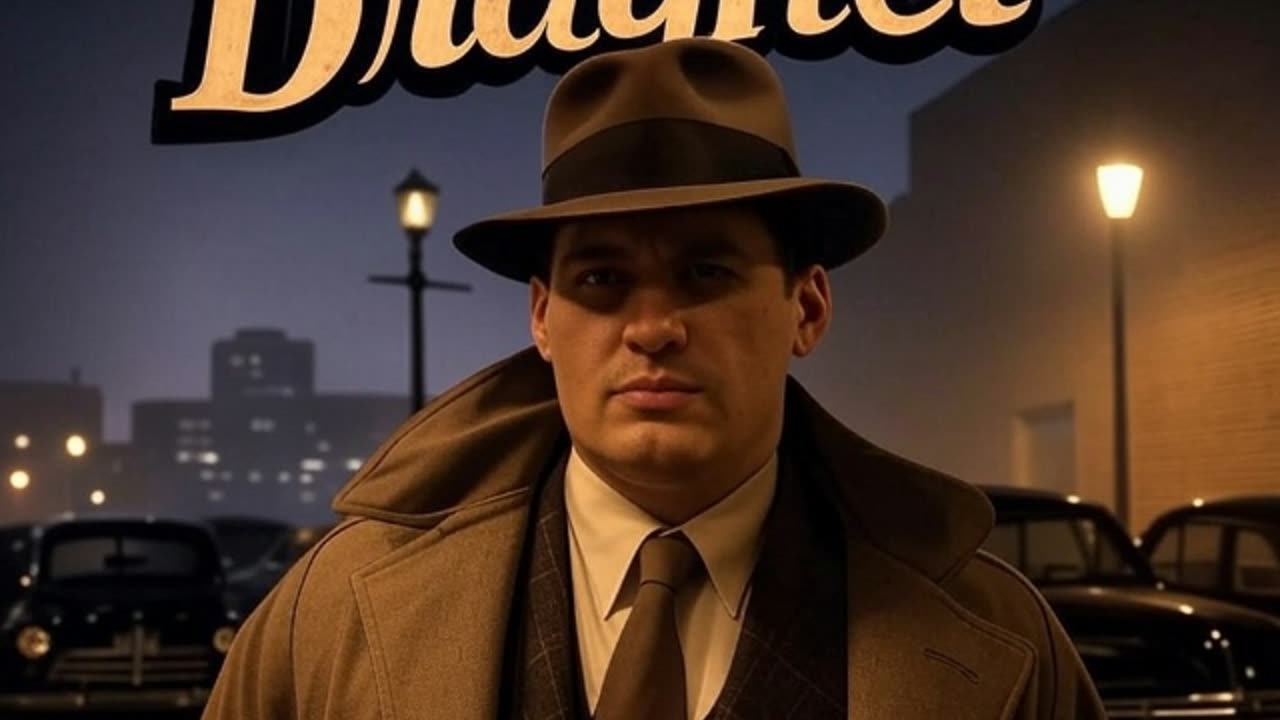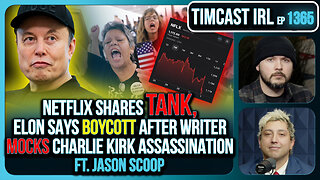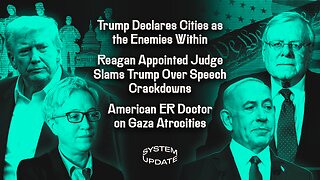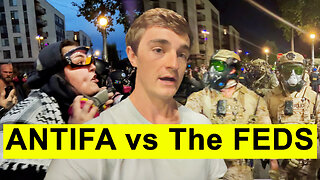Premium Only Content

Dragnet: Production 4 aka Homicide aka Quick Trigger Gun Men (June 24, 1949)
Setting: Los Angeles, California, in 1949, with scenes in police headquarters, city streets, a crime scene (possibly a bank or store), and suspects’ hideouts. The episode uses sound effects like police sirens, gunshots, footsteps, and radio dispatches to create a gritty, realistic urban atmosphere, emphasizing the procedural nature of police work.
Plot:
Introduction: The episode opens with the iconic Dragnet theme, “Danger Ahead,” featuring its four-note brass and timpani motif, followed by announcer Hal Gibney’s narration: “Ladies and gentlemen, the story you are about to hear is true. Only the names have been changed to protect the innocent.” Joe Friday’s voice-over sets the scene, noting the date (likely June 1949), time, and location, introducing a case from the LAPD’s Homicide Division.
The Crime: The story begins with a violent crime, likely a robbery or hold-up at a bank, liquor store, or similar establishment, where two “quick trigger” gunmen shoot and kill a victim—possibly a clerk, guard, or bystander—before fleeing. The killers’ reckless use of firearms, described as “quick trigger,” leaves a trail of chaos, with the homicide elevating the case’s urgency. The crime scene yields clues, such as shell casings or witness descriptions of the gunmen, setting Friday and his partner on the case.
The Investigation: Joe Friday (Jack Webb) and Sergeant Ben Romero (Barton Yarborough) are assigned to the homicide. They start with a meticulous investigation, interviewing witnesses, collecting forensic evidence (e.g., bullet casings analyzed by ballistics), and checking police files for suspects with a history of armed robbery. The episode showcases Dragnet’s signature realism, with Friday narrating procedural steps—canvassing neighborhoods, questioning informants, and coordinating with other LAPD units via radio. A lead might emerge from a tip about the gunmen’s flashy clothing, a getaway car, or a pawned stolen item.
Pursuing the Suspects: The detectives track the gunmen, possibly identified by aliases like “Johnny” or “Mike,” to a hideout, such as a cheap motel or apartment in LA’s underbelly. The investigation involves stakeouts, interrogations of associates (e.g., a bartender or girlfriend), and tense moments of surveillance. Dialogue reflects Webb’s commitment to authentic police jargon, with Romero’s occasional humor lightening the mood. The “quick trigger” aspect suggests the suspects are volatile, increasing the risk of a violent confrontation.
Climax and Resolution: The climax features a high-stakes confrontation, likely a shootout or arrest, as Friday and Romero corner the gunmen in a darkened alley, warehouse, or hideout. The suspects’ quick trigger instincts lead to gunfire, with sound effects of shots, shouts, and handcuffs snapping. The gunmen are apprehended or killed, and evidence—firearms, stolen goods, or witness testimonies—secures their guilt. Gibney’s closing narration details the outcome, likely convictions for murder and robbery, with prison sentences or death penalties, reflecting 1949 California law. Friday’s final voice-over underscores the tragedy of the victim’s death and the police’s duty to protect the city.
Themes: The dangers of reckless violence, the relentless pursuit of justice, and the toll of homicide on communities. The episode reinforces Dragnet’s portrayal of police as methodical, heroic figures, countering sensationalized crime narratives.
Cast and Roles:
Sergeant Joe Friday: Played by Jack Webb, delivering a stoic, factual performance as the dedicated detective, with his clipped narration driving the procedural narrative.
Sergeant Ben Romero: Played by Barton Yarborough, portraying Friday’s seasoned partner with a warm, slightly humorous tone, balancing Friday’s intensity.
Supporting Characters: Unnamed ensemble actors, likely including:
Suspects (Gunmen): Voiced by radio veterans like Charlie McGraw or Frank Lovejoy, depicting volatile, trigger-happy criminals with gritty, defiant tones.
Witnesses/Informants: Crime scene bystanders, a shop clerk, or a nervous accomplice, voiced with varied accents to reflect LA’s diversity.
Police Personnel: Desk sergeants, ballistics experts, or radio operators, voiced briefly to highlight procedural details.
Announcer: Hal Gibney, delivering the opening and closing narrations, including the case’s resolution, with a clear, authoritative voice.
Note on Cast: Dragnet used a small, skilled cast of radio professionals, with Webb and Yarborough as the core, supported by actors doubling in minor roles. Performances prioritized realism, avoiding the melodrama of shows like The Sealed Book.
Production Details:
Music: The “Danger Ahead” theme, composed by Walter Schumann, opens and closes the episode, with minimal incidental music to maintain realism. Sound effects carry the narrative’s tension.
Writer/Director: Jack Webb, with contributions from James E. Moser, adapting the script from real LAPD case files, emphasizing procedural accuracy and authentic dialogue.
Sound Effects: Essential to the episode, including police sirens, gunshots, footsteps, radio static, and door knocks, creating a vivid urban crime scene. The “quick trigger” gunmen’s firearms may be highlighted with rapid, sharp shots.
Sponsor: Unsponsored in its early run, Dragnet relied on NBC’s support, with no commercial breaks noted in this episode, allowing uninterrupted storytelling.
World and National Events Around June 24, 1949:
To provide context for the broadcast, here are key world and national events occurring in June 1949, reflecting the post-war and early Cold War climate that shaped listeners’ perspectives:
World Events:
Cold War Tensions: The Berlin Blockade ended on May 12, 1949, with the U.S.-led Berlin Airlift defeating Soviet efforts to isolate West Berlin. By June, the establishment of West Germany (May 23) and NATO (April 4) solidified Western alliances, with radio news highlighting U.S.-Soviet rivalry as a global concern.
Chinese Civil War: The Chinese Communist Party, led by Mao Zedong, continued its advance, capturing Shanghai in May 1949. U.S. media reported fears of a Communist victory, fueling anti-communist sentiment and debates over U.S. policy in Asia.
International Developments: The Council of Europe, formed on May 5, promoted European unity, while the U.S. pushed containment policies against communism, a frequent radio news topic. The Geneva Conventions were being finalized (adopted August 1949), reflecting post-war humanitarian efforts.
South African Apartheid: South Africa’s apartheid system tightened with the Prohibition of Mixed Marriages Act (May 1949), drawing U.S. media criticism as a human rights issue, reported alongside global decolonization movements.
National Events:
Red Scare and McCarthyism: The House Un-American Activities Committee (HUAC) intensified investigations into alleged communist influence, with the Alger Hiss trial (began May 31, 1949) accusing a former State Department official of espionage. Radio broadcasts amplified public fears of internal subversion.
Economic Prosperity: Post-war economic growth continued, with unemployment at 5.9% and rising consumer spending. The Fair Labor Standards Act amendments (1949) raised the minimum wage to 75 cents, boosting worker optimism, covered in news reports.
Entertainment and Morale: Hollywood thrived, with films like The Fountainhead (premiered June 23) and Sands of Iwo Jima (filming in 1949) reflecting patriotic and individualistic themes. Radio shows like The Lone Ranger and Suspense were popular, while Dragnet’s realistic crime drama introduced a fresh style.
Sports and Culture: The 1949 MLB season saw the New York Yankees and Brooklyn Dodgers leading, with Jackie Robinson’s impact breaking racial barriers. The NBA’s formation (June 6) marked a sports milestone. Nat King Cole’s rising hits, like “Nature Boy,” defined the era’s music scene.
Cultural Context: Aired during the early Cold War, “Quick Trigger Gun Men” resonated with American listeners by portraying police as steadfast protectors against violent crime, reflecting a national desire for stability amid fears of communism and urban unrest. The episode’s focus on reckless gunmen tapped into post-war anxieties about rising crime rates, amplified by noir films like White Heat (released September 1949) and pulp detective stories. Dragnet’s procedural realism, airing Friday nights, offered a grounded contrast to sensational horror like The Sealed Book, appealing to listeners seeking narratives that celebrated law enforcement’s role in a prosperous yet uncertain nation. The “quick trigger” moniker added a vivid, if dramatic, hook, aligning with Webb’s balance of authenticity and storytelling.
-
 2:08:38
2:08:38
TimcastIRL
10 hours agoNetflix Shares TANK, Elon Says BOYCOTT After Writer MOCKS Charlie Kirk Assassination
230K178 -
 8:48:01
8:48:01
SpartakusLIVE
12 hours agoI'M BACK || Quads w/ The Boys
87.3K9 -
 9:33
9:33
Ken LaCorte: Elephants in Rooms
15 hours ago $4.29 earnedWhy Do Black Men Love Big Butts?
35.6K24 -
 2:12
2:12
From Zero → Viral with AI
1 day ago $12.48 earned🚀 AI Marketing Isn’t Just for Big Brands Anymore — Here’s Why
51.2K10 -
 9:51:58
9:51:58
Dr Disrespect
19 hours ago🔴LIVE - DR DISRESPECT - 10 WINS ON CONTROLLER - BO7 TOMORROW
320K21 -
 1:24:56
1:24:56
Glenn Greenwald
13 hours agoTrump Declares Cities as the Enemies Within; Reagan Appointed Judge Slams Trump Over Speech Crackdowns; American ER Doctor on Gaza Atrocities | SYSTEM UPDATE #524
147K106 -
 4:07:42
4:07:42
I_Came_With_Fire_Podcast
18 hours agoPete Hegseth and the Chamber of Standards | Digital IDs | Taiwan Chips & Salsa | CDL Crisis
41.6K2 -
 2:01:46
2:01:46
Adam Does Movies
18 hours ago $0.73 earnedTalking Movies + Ask Me Anything - LIVE
25.1K -
 29:11
29:11
Nick Shirley
10 hours ago $6.21 earnedPortland has Fallen... ANTIFA Take Control of City
25.2K54 -
 1:19:00
1:19:00
VapinGamers
10 hours ago $2.13 earnedJump Space - We All Scream in Space - Early Access - !rumbot !music
21.7K2